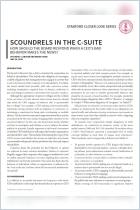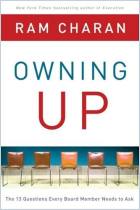Зарегистрируйтесь на getAbstract, чтобы получить доступ к этому краткому изложению.

Зарегистрируйтесь на getAbstract, чтобы получить доступ к этому краткому изложению.
David F. Larcker and Brian Tayan
Chairman and CEO
The Controversy over Board Leadership Structure
Stanford Business, 2016
Что внутри?
Is it helpful or harmful for a CEO also to serve as his or her company’s chairman of the board?
Recommendation
Does moving away from a dual CEO/board chair corporate governance structure lead to better company oversight and performance? Not always, according to David F. Larcker and Brian Tayan of Stanford University. In this succinct report, Larker and Tayan use a sampling of 187 top firms to explore the logic, logical fallacies and statistics surrounding separation of the CEO and board chair roles. They raise pertinent questions for companies considering changes to their leadership structures. getAbstract recommends this report to business leaders and corporate shareholders.
Summary
About the Authors
David F. Larcker is senior faculty member of the Center for Corporate Governance at Stanford. Brian Tayan is a researcher with the Corporate Governance Research Program at Stanford.






















Comment on this summary